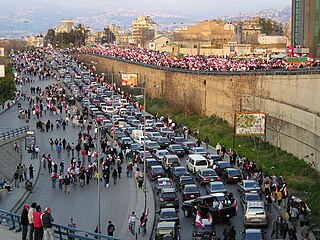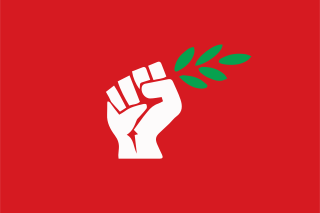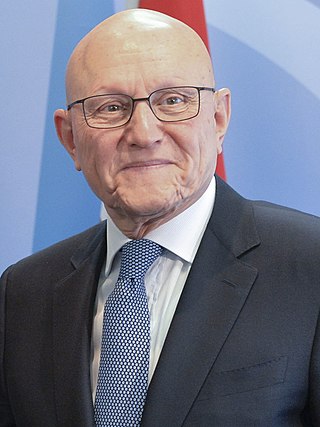Related Research Articles
Lebanon is a parliamentary democratic republic within the overall framework of confessionalism, a form of consociationalism in which the highest offices are proportionately reserved for representatives from certain religious communities. The constitution of Lebanon grants the people the right to change their government. However, from the mid-1970s until the parliamentary elections in 1992, the Lebanese Civil War (1975–1990) precluded the exercise of political rights.

Michel Naim Aoun is a Lebanese politician and former general who served as the 13th president of Lebanon from 31 October 2016 to 30 October 2022.

The Cedar Revolution, also known as the Independence uprising, was a chain of demonstrations in Lebanon triggered by the assassination of former Lebanese Prime Minister Rafic Hariri. The popular movement was remarkable for its avoidance of violence, peaceful approach, and its total reliance on methods of civil resistance.
General elections were held in Lebanon in May and June 2005 to elect the 128 members of the Parliament of Lebanon. They were the second elections in thirty years without a Syrian military or intelligence presence in Lebanon. These elections were the first in Lebanese history to be won outright by a single electoral block and were also the first to be monitored by the United Nations.

The Free Patriotic Movement is a Lebanese political party. Founded by Michel Aoun in 1994, the party is currently led by Aoun's son-in-law Gebran Bassil since 2015.

Saad El-Din Rafik Al-Hariri is a Turkish Saudi Arabian businessman and politician who served as the prime minister of Lebanon from 2009 to 2011 and 2016 to 2020. The son of Rafic Hariri, he founded and has been leading the Future Movement party since 2007. He is seen as "the strongest figurehead" of the March 14 Alliance.

The Future Movement is a Lebanese political party affiliated with the Sunni sect. The party was founded as a coalition in 1995 led by Rafic Hariri which was known as the Hariri Bloc but was officially founded in 2007. The party is led by Saad Hariri.

The March 14 Alliance, named after the date of the Cedar Revolution, was a coalition of political parties and independents in Lebanon formed in 2005 that were united by their anti-Syrian stance and by their opposition to the March 8 Alliance. It was led by Saad Hariri, Walid Jumblatt and Samir Geagea, as well as other prominent figures.

The 2006–2008 Lebanese protests were a series of political protests and sit-ins in Lebanon that began on 1 December 2006, led by groups that opposed the US and Saudi-backed government of Prime Minister Fouad Siniora and ended on 21 May 2008 with the signing of the Doha Agreement. The opposition was made up of Hezbollah, Amal, and the Free Patriotic Movement (FPM); a number of smaller parties were also involved, including the Marada party, the Lebanese Communist Party and the Syrian Social Nationalist Party. A majority of the members of the government were part of the anti-Syrian March 14 Alliance, a coalition of political parties and independents in Lebanon. The two groups were also divided along religious lines, with most Sunnis and Druze supporting the government, and most Shi'a supporting the opposition. The Christian community was split between the two factions, with Michel Aoun, the leader of the FPM, claiming to have more than 70% support among the Christians, based on the results of the 2005 parliamentary election.

The Armenian Revolutionary Federation, also known simply as Tashnag, is an Armenian political party active in Lebanon since the 1920s as an official political party in the country after having started with small student cells in the late 1890s and early 20th century.
General elections were held in Lebanon between 18 August and 15 September 1996. Independent candidates won the majority of seats, although most of them were considered members of various blocs. Voter turnout was 43.3%.

Beirut II was a parliamentary constituency in Lebanon. It covered three neighbourhoods (quartiers) in the north-eastern parts of the capital; Port, Medawar and Bachoura. The constituency elected four members of the National Assembly. Two of the Beirut II MPs had to be Armenian Orthodox, 1 Sunni Muslim and 1 Shia Muslim. The constituency was created with the 2008 Doha Agreement, ahead of the 2009 parliamentary election.

General elections were held in Lebanon on 6 May 2018. Although originally scheduled for 2013, the election was postponed three times in 2013, 2014 and 2017 for various reasons, including the security situation, the failure of the Parliament to elect a new President, and the technical requirements of holding an election. A new electoral law adopted in 2017 provides a proportional representation system for the first time.

Tammam Saeb Salam is a Lebanese politician who was the Prime Minister of Lebanon from February 2014 until December 2016. He also served as the acting President of Lebanon from May 2014 until October 2016 in his capacity as prime minister. He previously served in the government of Lebanon as minister of culture from 2008 to 2009.

Beirut Madinati is a volunteer-led political campaign that emerged in April 2016 to run in 8 May 2016 Beirut municipality elections and in the 2022 Lebanese general elections. The campaign launched from the 2015–16 Lebanese protests as a reaction to power and water shortages, streets filled with trash, and a dizzying urban infrastructure.

Beirut I is an electoral district in Lebanon. The district elects eight members of the Lebanese National Assembly – three Armenian Orthodox, one Armenian Catholic, one Greek Catholic, one Greek Orthodox, one Maronite and one Minorities.

Beirut II is an electoral district in Beirut, Lebanon, as per the 2017 vote law. The district elects 11 members of the Lebanese National Assembly - 6 Sunnis, 2 Shias, 1 Druze, 1 Greek Orthodox, 1 Evangelical.

General elections were held in Lebanon on 15 May 2022 to elect all 128 members of the Lebanese Parliament. The country has for several years been the subject of chronic political instability as well as a serious economic crisis aggravated by the 2020 explosions that hit the Port of Beirut and faced large-scale demonstrations against the political class.

Voting to elect eleven members of the Lebanese parliament took place in the Beirut II district on 6 May 2018, part of the general election of that year. The constituency had 353,164, out of whom 143,829 voted. Residents elect 6 Sunnis, 2 Shias, 1 Druze, 1 Greek Orthodox and 1 Evangelical.

Voting to elect eight members of the Lebanese parliament took place in the Beirut I district on 15 May 2022, part of the general election of that year. The constituency had 134,886 registered voters out of whom 48,311 voted.
References
- ↑ Al-Jazeera. Lebanon: Civil groups seek change in local elections
- 1 2 3 Al-Arabiya. Lebanon municipal elections kick off in Beirut
- ↑ Ya Lubnan. Future Movement list wins Beirut Municipal elections
- 1 2 3 Daily Star. Hariri indicates clean sweep of Beirut local elections
- 1 2 ABC News. Lebanon Holds Local Elections, 1st Vote in 6 Years
- 1 2 3 The National. Lebanon holds local elections, the first in six years
- ↑ "Beirut shocks its old guard: The established leaders are jolted by a party of protest". The Economist . 11 May 2016. Retrieved 12 May 2016.
- ↑ Reuters. Hariri-backed list wins Beirut vote - leader, local media